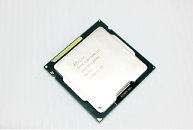qubit
Overclocked quantum bit
- Joined
- Dec 6, 2007
- Messages
- 17,865 (2.88/day)
- Location
- Quantum Well UK
| System Name | Quantumville™ |
|---|---|
| Processor | Intel Core i7-2700K @ 4GHz |
| Motherboard | Asus P8Z68-V PRO/GEN3 |
| Cooling | Noctua NH-D14 |
| Memory | 16GB (2 x 8GB Corsair Vengeance Black DDR3 PC3-12800 C9 1600MHz) |
| Video Card(s) | MSI RTX 2080 SUPER Gaming X Trio |
| Storage | Samsung 850 Pro 256GB | WD Black 4TB | WD Blue 6TB |
| Display(s) | ASUS ROG Strix XG27UQR (4K, 144Hz, G-SYNC compatible) | Asus MG28UQ (4K, 60Hz, FreeSync compatible) |
| Case | Cooler Master HAF 922 |
| Audio Device(s) | Creative Sound Blaster X-Fi Fatal1ty PCIe |
| Power Supply | Corsair AX1600i |
| Mouse | Microsoft Intellimouse Pro - Black Shadow |
| Keyboard | Yes |
| Software | Windows 10 Pro 64-bit |
Intel's Ivy Bridge line of processors are not due for release until spring 2012, but it looks like Chinese website Coolaler has scored a sneak peak at the performance level of Intel's 22 nm Ivy Bridge platform by testing an engineering sample of a quad core CPU. The screenshot shows CPU-Z & Task Manager (no HyperThreading) readouts, while the AIDA64 Cache & Memory benchmark has been run. The CPU used is a 2 GHz sample as shown by the photo, which CPU-Z reports as running at its 2.4 GHz turbo boost speed (20% overclock) on a Gigabyte GA-Z68X-UD7-B3 motherboard. Rough and ready verdict: about the same speed as the current Sandy Bridge, but with a significantly enhanced northbridge and graphics core. The AIDA64 scores are actually slightly lower than the current SB scores, but this is likely because the CPU is running unsupported and unoptimized due to a mobo BIOS that's not made for it and a benchmark that cannot measure its true performance. Note the memory speeds, which were run fast at 2134 MHz 6-9-6-24 CR2, further indicating lack of optimization, since these timings suggest somewhat better performance than what was measured.


So, for any PC enthusiasts looking to upgrade their systems to play the latest high performance 3D games, should they get a current Sandy Bridge CPU or wait for Ivy Bridge? Well, if the results of Coolaler's tests are anything to go by - no gaming tests have been done though - they needn't bother waiting. To reinforce this, there's also the fact that Intel's current 2500K/2600K/2700K processors can run any of the latest games out there very fluidly indeed and the 2500K in particular, is very affordable. However, there's still quite some time before launch and as this CPU uses Intel's new 22 nm tri-gate transistors, it would be unlikely that Intel wouldn't go for at least some performance jump over their current generation, given that this is a "tick" stage design in Intel's established tick-tock processor development strategy. Note that IB is engineered more for better energy efficiency than SB, rather than just raw processing performance. However, this should have the nice benefit of making it even more overclockable, so a significant performance increase over SB may possibly be obtained that way, at the expense of power consumption. If the upgrade is needed "right now", then a current SB should probably be purchased, as the new CPU uses the same socket and the old CPU can just be sold off. However, if there's no particular pressure, then perhaps one should wait a little longer to see what performance reports show up in the next month or two.
The English source was Nordic Hardware, who reported on the Chinese coolaler results.
View at TechPowerUp Main Site


So, for any PC enthusiasts looking to upgrade their systems to play the latest high performance 3D games, should they get a current Sandy Bridge CPU or wait for Ivy Bridge? Well, if the results of Coolaler's tests are anything to go by - no gaming tests have been done though - they needn't bother waiting. To reinforce this, there's also the fact that Intel's current 2500K/2600K/2700K processors can run any of the latest games out there very fluidly indeed and the 2500K in particular, is very affordable. However, there's still quite some time before launch and as this CPU uses Intel's new 22 nm tri-gate transistors, it would be unlikely that Intel wouldn't go for at least some performance jump over their current generation, given that this is a "tick" stage design in Intel's established tick-tock processor development strategy. Note that IB is engineered more for better energy efficiency than SB, rather than just raw processing performance. However, this should have the nice benefit of making it even more overclockable, so a significant performance increase over SB may possibly be obtained that way, at the expense of power consumption. If the upgrade is needed "right now", then a current SB should probably be purchased, as the new CPU uses the same socket and the old CPU can just be sold off. However, if there's no particular pressure, then perhaps one should wait a little longer to see what performance reports show up in the next month or two.
The English source was Nordic Hardware, who reported on the Chinese coolaler results.
View at TechPowerUp Main Site
Last edited by a moderator:










